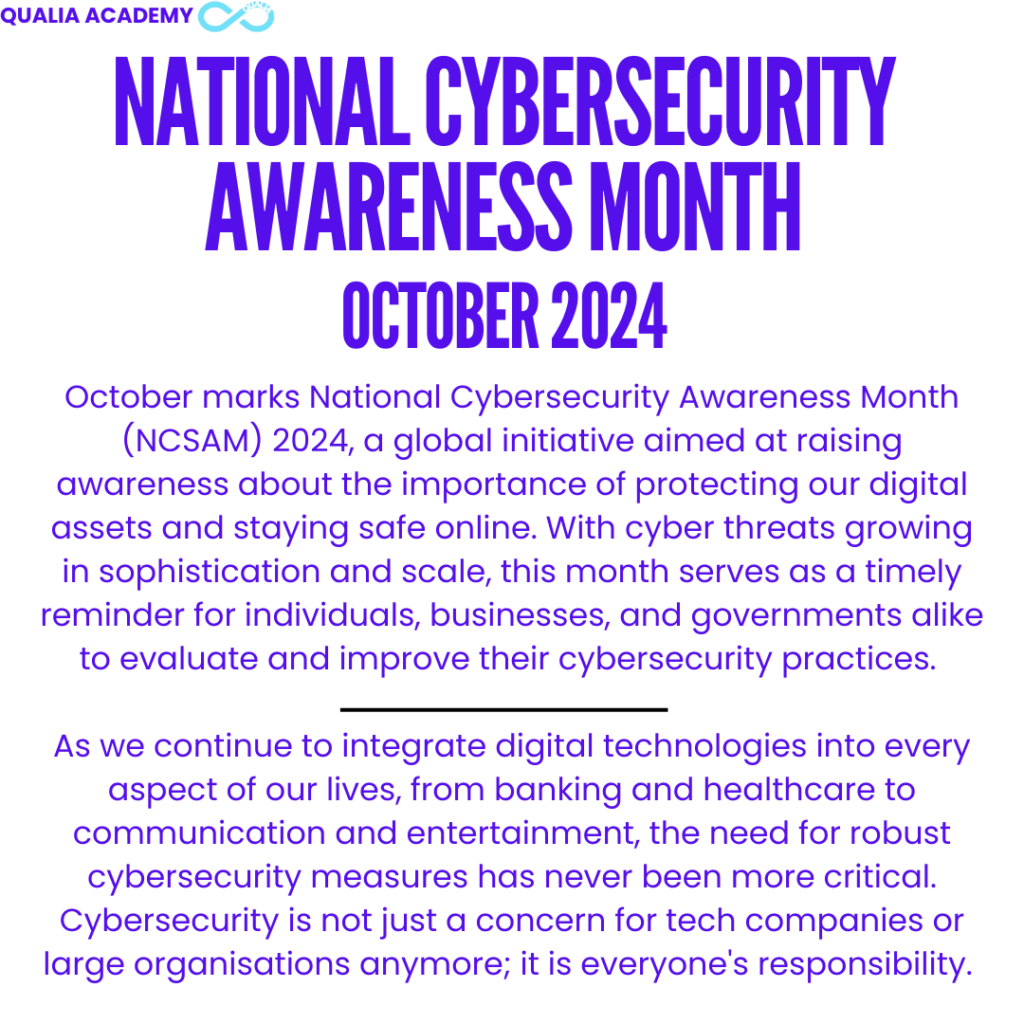
October marks National Cybersecurity Awareness Month (NCSAM) 2024, a global initiative aimed at raising awareness about the importance of protecting our digital assets and staying safe online. With cyber threats growing in sophistication and scale, this month serves as a timely reminder for individuals, businesses, and governments alike to evaluate and improve their cybersecurity practices.
As we continue to integrate digital technologies into every aspect of our lives, from banking and healthcare to communication and entertainment, the need for robust cybersecurity measures has never been more critical. Cybersecurity is not just a concern for tech companies or large organisations anymore; it is everyone’s responsibility.
What is National Cybersecurity Awareness Month?
National Cybersecurity Awareness Month was first launched in 2004 by the United States Department of Homeland Security and the National Cyber Security Alliance. Since then, it has grown into a global movement that encourages people to take proactive steps to protect themselves from cyber threats. Each year, the month is built around different themes and focuses, aimed at educating various sectors on best practices for staying secure in an increasingly digital world.
The theme for NCSAM 2024 is “Securing Our Digital Future”, highlighting the need for long-term strategies that not only deal with current threats but also anticipate future challenges. This theme is particularly relevant in light of the rapid advancements in artificial intelligence (AI), cloud computing, and the Internet of Things (IoT), which are expanding the cyber-attack surface.
The Importance of Cybersecurity in 2024
The landscape of cybersecurity is constantly evolving. In 2024, we are witnessing a new era of cyber-attacks that target critical infrastructure, personal data, and financial assets. From ransomware attacks to phishing scams, these threats are not only more frequent but also more sophisticated.
According to a 2024 report from the National Cyber Security Centre (NCSC) in the UK, cyber-attacks have increased by 35% in the past year, with small and medium-sized enterprises (SMEs) being the hardest hit. The report emphasises that no one is immune, as cybercriminals are becoming adept at exploiting vulnerabilities across all sectors and organisations of all sizes.
Key Cybersecurity Threats in 2024:
Ransomware Attacks:
Ransomware remains one of the most prevalent cyber threats in 2024. Criminals infiltrate systems, encrypt valuable data, and demand a ransom for its release. The rise of “double extortion” ransomware, where attackers not only encrypt data but also threaten to release sensitive information, has further complicated the issue.
Phishing and Social Engineering:
Cybercriminals continue to exploit human error through phishing attacks, which use deceptive emails or messages to trick users into divulging personal information or clicking malicious links. The advent of AI-driven phishing techniques has made these scams even more convincing and harder to detect.
IoT Vulnerabilities:
With the increasing adoption of IoT devices in homes and businesses, hackers are finding new ways to exploit vulnerabilities in connected devices. From smart home systems to industrial control systems, poorly secured IoT devices can provide cybercriminals with a backdoor into networks.
Cloud Security Challenges:
As more organisations migrate to cloud-based services, securing cloud environments has become a priority. Misconfigured cloud settings and weak access controls are common issues that leave sensitive data exposed to cybercriminals.
How Can Individuals and Businesses Stay Protected With their Cybersecurity?
While the threat landscape is daunting, there are several practical steps that individuals and businesses can take to strengthen their cybersecurity posture:
Enable Multi-Factor Authentication (MFA)
One of the simplest yet most effective ways to protect online accounts is by enabling MFA. This adds an additional layer of security beyond just a password, requiring a secondary form of authentication, such as a code sent to your mobile phone or an app-based notification.
Regular Software Updates
Cybercriminals often exploit known vulnerabilities in outdated software. Ensure that all operating systems, applications, and firmware are regularly updated with the latest security patches. This is especially important for IoT devices and cloud-based services.
Create Strong Passwords
Weak or reused passwords remain a major security risk. Use a password manager to create and store complex passwords for all your accounts. Additionally, avoid using easily guessable passwords or sharing them across multiple platforms.
Educate Employees and Family Members
Human error is the leading cause of cyber incidents. Businesses should invest in cybersecurity awareness training to educate employees about recognising phishing scams, securing sensitive data, and following security best practices. Likewise, individuals should educate their families, particularly younger or elderly members, about the risks of online threats.
Backup Data Regularly
Backing up important data is crucial for both businesses and individuals. In the event of a ransomware attack, having an up-to-date backup can ensure that you can restore your data without paying the ransom. Make sure your backups are stored securely, preferably in a location that is not connected to your main network.
The Role of Governments and Organisations
While individual action is crucial, governments and large organisations also have a significant role to play in enhancing national and global cybersecurity. In the UK, the National Cyber Security Centre (NCSC) works alongside public and private sectors to defend critical infrastructure and respond to major cyber incidents. Additionally, the UK’s 2024 Cybersecurity Strategy emphasises public-private partnerships to share threat intelligence and improve collective defences.
Cybersecurity regulations are becoming stricter across Europe, particularly with the enforcement of the General Data Protection Regulation (GDPR), which requires businesses to take adequate steps to protect personal data. Failure to comply can result in heavy fines, reinforcing the need for robust cybersecurity measures.
Moving Forwards
National Cybersecurity Awareness Month 2024 offers an opportunity for everyone to evaluate their online safety practices and take actionable steps to protect themselves from cyber threats. Whether you’re an individual, a business, or a government entity, staying informed and proactive is essential to securing our digital future.
By embracing best practices such as enabling multi-factor authentication, keeping software updated, and educating those around us, we can collectively reduce the risk of cyber-attacks. With cyber threats on the rise, this month serves as a crucial reminder that cybersecurity is a shared responsibility. Let’s use National Cybersecurity Awareness Month as a catalyst to secure our digital lives, now and for the future.









